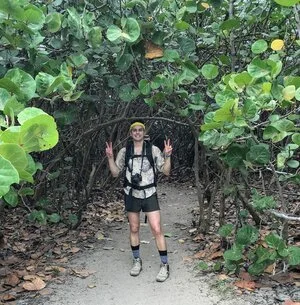This article was originally published by Shedd Aquarium’s Surge, a digital handbook for living life in harmony with our blue planet. Learn more about Surge here.
Forrest Cortes is on the Board of Chicago Audubon Society and is the founder of Chicago’s Out in Nature.
When people consider challenges to accessing nature, they tend to think of proximity to green spaces, access to transportation and other solely physical factors. Further, nature is often thought of as a great equalizer—a level playing field where all can recreate and breathe freely—but history and current events tell us that this isn’t true for all people.
Outdoor culture can be steeped in exclusivity. Stereotyping and prejudice still prevent many people from enjoying a walk in the woods, a picnic along the lakeshore or a volunteer experience with a new group. As a mixed-race gay man, I have seen this firsthand.
I have witnessed conservationists in positions of power who have questioned pronoun preferences. I have seen entire groups of outdoorspeople pass judgement on individuals’ clothes in ways that don’t fit with their assumptions about gender norms. I’ve seen sneers, heard passing comments and have personally experienced verbal harassment just walking in the proximity of a stranger outdoors. More times than I can count, I’ve had to consciously assess the safety of holding hands with my partner in both isolated and not-so-isolated outdoor spaces.
Out In Nature adventurers take in the beauty of Indiana Dunes National Park.
A few years ago, I found camaraderie in a national online group founded by queer naturalist Theia Calidris. I found commonality and community in the stories of members across the country.
The groundbreaking work of Theia inspired me to launch Out In Nature in 2019 with the support of Chicago Audubon Society. As an affinity space, Out In Nature protects space for LGBTQIA+ identifying people to find joy in Chicago’s great outdoors in a safe and welcoming setting.
Out In Nature is designed to be welcoming for people with varying levels of comfort and familiarity with outdoor experiences. From joining Kayak for Conservation with Shedd to volunteering on stewardship days with the Forest Preserves of Cook County, to birding and wildflower walks with the Chicago Park District, our events seek to connect us with nature and one another. Our meetups highlight the biodiversity of the Chicago Region, while also bringing into focus the diversity of our own communities by bringing together people from different generations, cultural backgrounds and geographies to share space.
I’ve sometimes heard concern about exclusion when affinity groups are created. People might say, “But what about folks who aren’t a part of that group? Won’t they feel left out?” Centering this perspective further marginalizes people who have been sidelined by the conservation movement throughout history.
Those marginalized communities have unique needs, perspectives and expertise that aren’t always considered or incorporated in the planning of largescale events. In truth, programs and events have been, and continue to be, largely catered to dominant identities. Including LGBTQIA+ communities typically becomes an after-thought, while also lacking the perspective necessary to intentionally welcome those individuals.
Good community engagement practitioners know that a “build it and they will come” model doesn’t work. Instead, the best practice is to build together.
When asked by allies about how they can engage with Out In Nature, I often encourage them to share the program with LGBTQIA+ people in their lives and to respect the space we are crafting. Affinity spaces like Out In Nature allow our communities to shape our own experiences in nature, thus correcting others’ assumptions about our interests and needs with our own expertise. Maybe one day affinity spaces won’t be necessary, but right now, there’s healing and trust-building that needs to be done for our communities, and other communities who have been left out of conservation planning and engagement.
If you are an LGBTQIA+ individual who is interested in hearing about upcoming events, we’d love to have you join the Out In Nature online community or reach out to be added to our email list. If you are an ally, please share our group with LGBTQIA+ friends and family. See you Out In Nature!
—Forrest Cortes @urbantarzann



